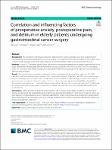Item Infomation
Full metadata record
| DC Field | Value | Language |
|---|---|---|
| dc.contributor.author | Qing, Liu | - |
| dc.contributor.author | Liheng, Li | - |
| dc.contributor.author | Jingwen, Wei | - |
| dc.date.accessioned | 2023-03-16T04:17:34Z | - |
| dc.date.available | 2023-03-16T04:17:34Z | - |
| dc.date.issued | 2023 | - |
| dc.identifier.uri | https://link.springer.com/article/10.1186/s12871-023-02036-w | - |
| dc.identifier.uri | https://dlib.phenikaa-uni.edu.vn/handle/PNK/6912 | - |
| dc.description | CC BY | - |
| dc.description.abstract | Preoperative anxiety is a typical emotional issue among surgical patients. Studies have shown that preoperative anxiety affects patients on both a physiological and a psychological level [1]. Surgery and anesthesia are the main factors that contribute to preoperative anxiety. The incidence of preoperative anxiety in Chinese adults is 16.9%, and female gender and highly invasive surgery have been identified as risk factors for high preoperative anxiety [2]. Preoperative anxiety has been shown to play an important role in modulating postoperative pain [3,4,5,6]. The literature and research are based on the theory of a linear rather than curvilinear relationship between anxiety and pain, meaning that with increased anxiety there is an increase in pain [7]. | vi |
| dc.language.iso | en | vi |
| dc.publisher | Springer | vi |
| dc.subject | preoperative anxiety | - |
| dc.subject | postoperative pain | - |
| dc.title | Correlation and influencing factors of preoperative anxiety, postoperative pain, and delirium in elderly patients undergoing gastrointestinal cancer surgery | vi |
| dc.type | Book | vi |
| Appears in Collections | ||
| OER- Y học- Điều dưỡng | ||
Files in This Item:

